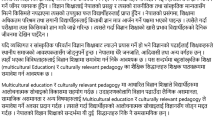Abstract
This forum constitutes a cogenerative inquiry using postcolonial theory drawn from the review paper by Zembylas and Avraamidou. Three teacher educators from African, Asian and Caribbean countries reflect on problems confronting their professional practices and consider the prospects of creating culturally inclusive science education. We learn that in Mozambique, Nepal and the Caribbean scientism patrols the borders of science education serving to exclude local epistemological beliefs and discourses and negating culturally contextualized teaching and learning. Despite the diverse cultural hybridities of these countries, science education is disconnected from the daily lives of the majority of their populations, serving inequitably the academic Western-oriented aspirations of an elite group who are “living hybridity but talking scientism.” The discussants explore their autobiographies to reveal core cultural values and beliefs grounded in their non-Western traditions and worldviews but which are in conflict with the Western Modern Worldview (WMW) and thus have no legitimate role in the standard school/college science classroom. They reflect on their hybrid cultural identities and reveal the interplay of multiple selves grounded in both the WMW and non-WMWs and existing in a dialectical tension of managed contradiction in a Third Space. They argue for dialectical logic to illuminate a Third Space wherein students of science education may be empowered to challenge hegemonies of cultural reproduction and examine reflexively their own identities, coming to recognize and reconcile their core cultural beliefs with those of Western modern science, thereby dissipating otherwise strongly delineated cultural borders.
Similar content being viewed by others
References
Bajracharya, H., & Brouwer, W. (1997). A narrative approach to science teaching in Nepal. International Journal of Science Education, 19, 429–446.
Bhabha, H. (Ed.). (1990). Nation and narration. New York, NY: Routledge.
Bhabha, H. (1997). Editor’s introduction: Minority maneuvers and unsettled negotiations. Critical Inquiry, 23, 431–459.
Cezair-Thompson, M. (1999). The true history of paradise: A novel. New York, NY: Dutton.
Ferris, T. (1998). Coming of age in the Milky Way. New York, NY: Murrow.
Hall, S. (2001). Negotiating Caribbean identities. In B. Meeks & F. Lindahl (Eds.), New Caribbean thought: A reader (pp. 24–39). Jamaica: University of the West Indies Press.
Jegede, O. (1999). Science education in nonwestern cultures: Towards a theory of collateral learning. In L. Semali & J. Kincheloe (Eds.), What is indigenous knowledge? Voices from the academy (pp. 116–142). New York, NY: Falmer Press.
Kozoll, R. H., & Osborne, M. D. (2006). Developing a deeper involvement with science: Keith’s story. Cultural Studies of Science Education, 1, 161–187.
Luitel, B. C., & Taylor, P. C. (2007). The Shanai, the pseudosphere and other imaginings: Envisioning a culturally contextualised mathematics education. Cultural Studies of Science Education, 2, 621–638.
Richardson, L. (2000). Writing: A method of inquiry. In: N. Denzin & Y. Lincoln (Eds.), Handbook of qualitative research (2nd ed., pp. 923–947). Thousand Oaks, CA: Sage.
Roth, W.-M. (2007). Theorizing passivity. Cultural Studies of Science Education, 2, 1–8.
Taylor, P. C. (2006). Forum: Alternative perspectives: Cultural hybridity and third space science classrooms. Cultural Studies of Science Education, 1, 189–208.
Tobin K., Elmesky R., & Seiler G. (Eds.). (2005). Improving urban science education. New York, NY: Rowman & Littlefield.
Trouillot, M.-R. (1992). The Caribbean region: An open frontier in anthropological theory. Annual Review of Anthropology, 21, 19–42.
Winford, D. (2003). Ideologies of language and socially realistic linguistics. In S. Makoni, G. Smitherman, A. F. Ball, & A. K. Spears (Eds.), Black linguistics: Language, society, and politics in Africa and the Americas (pp. 21–39). New York, NY: Routledge.
Author information
Authors and Affiliations
Corresponding author
Rights and permissions
About this article
Cite this article
Adams, J., Luitel, B.C., Afonso, E. et al. A cogenerative inquiry using postcolonial theory to envisage culturally inclusive science education. Cult Stud of Sci Educ 3, 999–1019 (2008). https://doi.org/10.1007/s11422-008-9130-0
Received:
Accepted:
Published:
Issue Date:
DOI: https://doi.org/10.1007/s11422-008-9130-0




